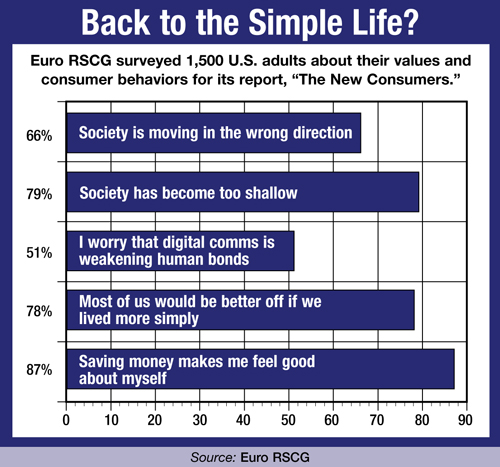A new study of consumers by Euro RSCG shows a shift in consumer values and behaviors, as people begin to rethink what is important and how they want to live. Analyzing the findings of its “New Consumers” survey of 5,700 adults in seven markets (Brazil, China, France, Japan, Netherlands, United Kingdom and the United States), the study reveals how changes in consumer consciousness are driving people away from the hyper-consumerism of recent decades and toward a more mindful approach to living and consuming (see the key U.S. findings below).
The questions for PR executives are: Will this change in consumer attitude and behavior affect how PR execs communicate with people? And what new messages will need to be devised? Marian Salzman, president of Euro RSCG Worldwide PR North America, says this rethinking will affect what her agency does. “I’ve just asked my director of strategy to pull together a white paper on what this might mean for back-to-school campaigns,” says Salzman. “There may be a trend toward selling people stuff that they need, versus what they want.” 
Nicola Moore, SVP at Golin Harris, says her agency has been tracking these trends for a while. “There’s no doubt we’re experiencing a fundamental shift in this country’s value equation,” says Moore. “We’ve emerged from an era of mass consumerism to a much more complex and community-based value set where people are expressing a desire to connect in a more meaningful way with the world around them.”
Moore believes that organizations that will be successful in reaching these “new consumers” are those that embrace the new value equation and infuse these learnings into their product development and go-to-market strategies. “It can no longer be an afterthought or layered onto a marketing program,” says Moore. “These initiatives must be authentic to stand up to and meet consumers’ shifting expectations.
The public’s interest in CSR practices is a sign that brands can no longer rely solely on price and production innovation to drive sales. “A brand’s reputation and its value proposition have never been more important,” she adds.
One finding that caught Moore’s eye was that more than half of Americans polled felt that digital communications “is weakening human bonds.” Says Moore: “We often talk to our clients about adopting a holistic approach to reaching their consumers. There is no doubt that digital communications has altered the way in which we interact and connect with each other. However, there is huge power in face-to-face and offline word-of-mouth communications.” In other words, don’t expect the digital train to pull back into the station.
But will this “back to basics” attitude last? Salzman believes it will. “Much like my grandparents never used a credit card, I think we’ll have a generation that will stay away from buying real estate,” she says.
Brenda Siler, owner and project director at Best Communication Strategies, a PR consultancy focused on association and nonprofits, is not so sure these findings have staying power.
The economy has been bringing people down, says Siler. “Consumers are trying to save more, but with unemployment levels still high, there is a sense of hopelessness about the future,” she says. “But whether through donating our time or money or getting back to basics, are we committed to improving our lot in life? The jury is still out.” PRN
CONTACT:
Marian Salzman, [email protected]; Nicola Moore, [email protected]; Brenda Siler, [email protected].
